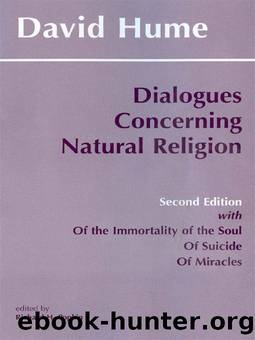Dialogues Concerning Natural Religion (Hackett Classics) by David Hume

Author:David Hume [Hume, David]
Language: eng
Format: epub
Tags: ebook
Publisher: Hackett Publishing Company, Inc.
Published: 1998-03-15T04:00:00+00:00
Part X
Demea: It is my opinion, I own, replied Demea, that each man feels, in a manner, the truth of religion within his own breast; and, from a consciousness of his imbecility and misery rather than from any reasoning, is led to seek protection from that Being on whom he and all nature are dependent. So anxious or so tedious are even the best scenes of life that futurity is still the object of all our hopes and fears. We incessantly look forward and endeavor, by prayers, adoration, and sacrifice, to appease those unknown powers whom we find, by experience, so able to afflict and oppress us. Wretched creatures that we are! What resource for us amidst the innumerable ills of life did not religion suggest some methods of atonement, and appease those terrors with which we are incessantly agitated and tormented?
Philo: I am indeed persuaded, said Philo, that the best and indeed the only method of bringing everyone to a due sense of religion is by just representations of the misery and wickedness of men. And for that purpose a talent of eloquence and strong imagery is more requisite than that of reasoning and argument. For is it necessary to prove what everyone feels within himself? It is only necessary to make us feel it, if possible, more intimately and sensibly.
Demea: The people, indeed, replied Demea, are sufficiently convinced of this great and melancholy truth. The miseries of life, the unhappiness of man, the general corruptions of our nature, the unsatisfactory enjoyment of pleasures, riches, honors; these phrases have become almost proverbial in all languages. And who can doubt of what all men declare from their own immediate feeling and experience?
Philo: In this point, said Philo, the learned are perfectly agreed with the vulgar; and in all letters, sacred and profane, the topic of human misery has been insisted on with the most pathetic eloquence that sorrow and melancholy could inspire. The poets, who speak from sentiment, without a system, and whose testimony has therefore the more authority, abound in images of this nature. From Homer down to Dr. Young,20 the whole inspired tribe have ever been sensible that no other representation of things would suit the feeling and observation of each individual.
Demea: As to authorities, replied Demea, you need not seek them. Look round this library of Cleanthes. I shall venture to affirm that, except authors of particular sciences, such as chemistry or botany, who have no occasion to treat of human life, there is scarce one of those innumerable writers from whom the sense of human misery has not, in some passage or other, extorted a complaint and confession of it. At least, the chance is entirely on that side; and no one author has ever, so far as I can recollect, been so extravagant as to deny it.
Philo: There you must excuse me, said Philo: Leibniz has denied it, and is perhaps the first21 who ventured upon so bold and paradoxical an opinion; at least, the first who made it essential to his philosophical system.
Download
This site does not store any files on its server. We only index and link to content provided by other sites. Please contact the content providers to delete copyright contents if any and email us, we'll remove relevant links or contents immediately.
The remains of the day by Kazuo Ishiguro(7575)
Tools of Titans by Timothy Ferriss(6964)
The Black Swan by Nassim Nicholas Taleb(6203)
Inner Engineering: A Yogi's Guide to Joy by Sadhguru(5910)
Giovanni's Room by James Baldwin(5894)
The Way of Zen by Alan W. Watts(5809)
The Six Wives Of Henry VIII (WOMEN IN HISTORY) by Fraser Antonia(4799)
The Power of Now: A Guide to Spiritual Enlightenment by Eckhart Tolle(4767)
Astrophysics for People in a Hurry by Neil DeGrasse Tyson(4627)
Asking the Right Questions: A Guide to Critical Thinking by M. Neil Browne & Stuart M. Keeley(4599)
12 Rules for Life by Jordan B. Peterson(3745)
The Ethical Slut by Janet W. Hardy(3511)
Skin in the Game by Nassim Nicholas Taleb(3477)
Housekeeping by Marilynne Robinson(3420)
The Art of Happiness by The Dalai Lama(3391)
Double Down (Diary of a Wimpy Kid Book 11) by Jeff Kinney(3284)
Skin in the Game: Hidden Asymmetries in Daily Life by Nassim Nicholas Taleb(3272)
Walking by Henry David Thoreau(3236)
12 Rules for Life: An Antidote to Chaos by Jordan B. Peterson(3209)
